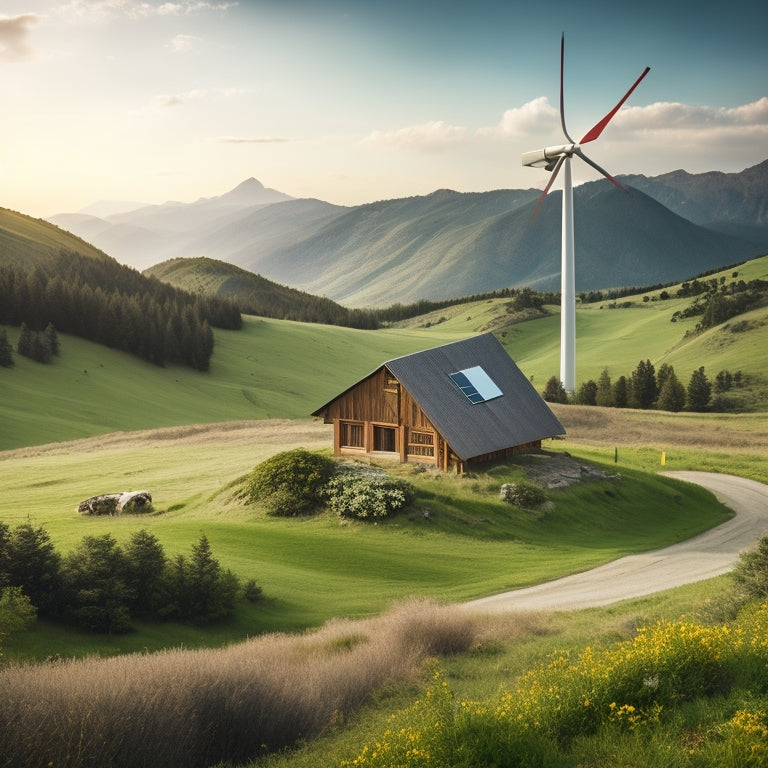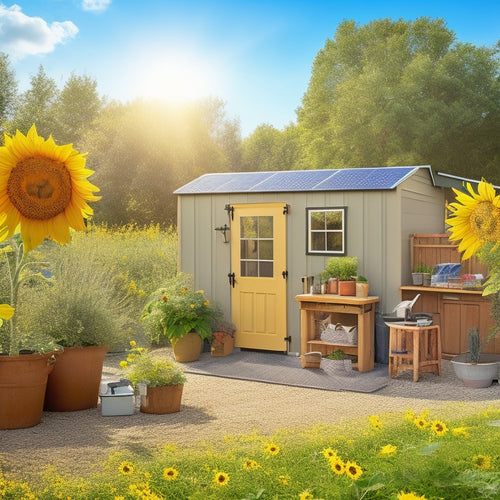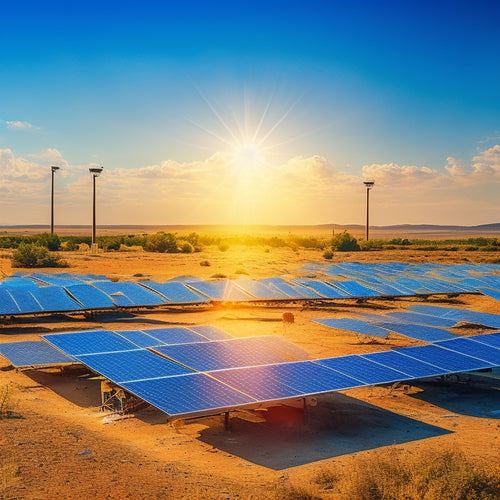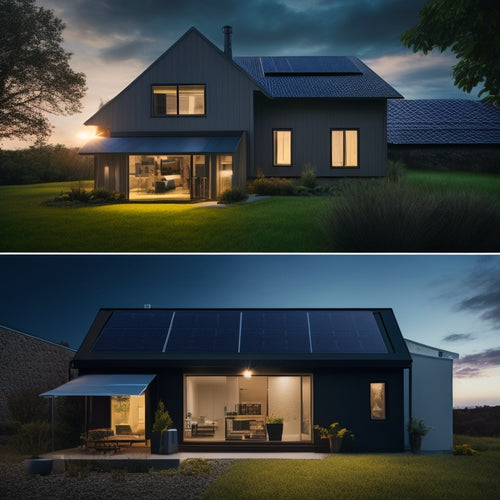
What to Consider Before Going Off Grid
Share
Before going off grid, you'll want to assess your energy needs by tracking daily consumption and evaluating usage patterns. You'll need to choose the right solar panel system, selecting the best battery type for your needs and understanding local building codes. Budgeting is also vital, as initial investments can be substantial. Consider land, materials, and infrastructure costs, and set aside emergency funds. By understanding these key factors, you'll set yourself up for success in your off-grid venture. Now, get ready to take a closer look at each of these essential considerations to guarantee a smooth shift to self-sufficiency.
Overview
- Assess your daily energy consumption to determine the size of the renewable energy system required for reliable power.
- Research local building codes, zoning regulations, and permits required for off-grid energy systems to ensure compliance.
- Evaluate the substantial initial investment required for renewable energy solutions and create a budget that includes land, materials, and infrastructure costs.
- Choose the right battery type, considering factors like energy density, lifespan, and recyclability, to ensure efficient energy storage.
- Consider the environmental impact of your off-grid transition, aiming to reduce your carbon footprint and promote sustainability.
Assessing Your Energy Needs
As you contemplate leaving the grid behind, it's vital to take a closer look at your energy usage to determine how much power you'll need to generate. Start by tracking your daily energy consumption to identify areas where you can cut back.
Conducting energy audits helps analyze usage patterns and identify inefficiencies, enabling you to focus on energy efficiency to maximize renewable energy investment benefits. Look for opportunities to reduce your energy usage by switching to energy-efficient appliances, upgrading to LED lighting, and optimizing your heating and cooling systems.
Evaluating your energy needs will help you determine the size of the renewable energy system you'll require. Consider your energy consumption patterns, including peak usage times and seasonal variations, to guarantee you have a reliable source of power.
Home Solar Panel System Installation
Your energy-efficient preparations have paved the way for a seamless change to off-grid living, and now it's time to employ the power of the sun. A well-designed home solar panel system installation is vital for a successful shift. You'll need to decide on the type of solar panels that suit your needs, considering factors like energy efficiency and cost.
| Solar Panel Type | Characteristics |
|---|---|
| Monocrystalline | High efficiency, expensive |
| Polycrystalline | Lower efficiency, cheaper |
| Thin-Film | Low efficiency, flexible |
| Bifacial | High efficiency, captures light from both sides |
During the installation process, confirm your system is properly sized and angled for peak energy production. Regular system maintenance is also fundamental to guarantee your system runs efficiently and effectively.
Choosing the Right Battery Type
Selecting the right battery type is vital to guaranteeing your off-grid system's reliability and efficiency.
You'll need to take into account lithium advantages, such as longer lifetimes and higher energy density, versus lead acid comparisons, which are often more affordable but heavier and less efficient.
Look for solar battery chargers with advanced features like MPPT and multi-stage charging to optimize energy harvesting and extend battery life.
Battery maintenance is essential, so think about capacity sizing to confirm you have enough power to meet your needs.
Don't forget about the environmental impact of your choice - lithium batteries have a lower carbon footprint, but lead acid batteries are more recyclable.
When it comes to storage solutions, consider the space and climate you have available.
Understanding Local Building Codes
One vital aspect of going off-grid that's often overlooked is understanding local building codes. You'll need to research and comply with zoning regulations, property permits, and other requirements specific to your area. Failing to do so can result in costly fines, penalties, or even demolition of your off-grid setup.
Additionally, it's important to evaluate the environmental impact of your off-grid system, as reduced carbon footprints can greatly contribute to a cleaner environment. Moreover, it's important to guarantee that your off-grid energy system is designed to meet your specific energy needs, considering factors such as energy independence and long-term cost savings.
Check with your local government to determine what permits and licenses are required for your project. You may need to obtain permits for electrical, plumbing, and septic systems, as well as for building structures like cabins or yurts.
Be prepared to provide detailed plans and drawings, and be flexible – you may need to make adjustments to your design to meet local regulations. By understanding local building codes, you can avoid legal issues and guarantee a smooth shift to off-grid living.
Budgeting for the Transition
Frequently, the financial aspect of going off-grid is a significant hurdle for many individuals.
You'll need to budget for the shift, including the cost of land, building materials, and infrastructure like solar panels or wind turbines.
Renewable energy solutions can be cost-effective in the long run, but require a substantial initial investment.
Consider implementing cost-saving strategies, such as repurposing materials, buying second-hand, and DIY projects.
It's also essential to set aside emergency funds for unexpected expenses, like equipment failures or natural disasters.
Start by calculating your total costs, then break them down into manageable chunks.
Create a realistic timeline and prioritize your spending.
Frequently Asked Questions
Can I Still Use My Current Appliances With Off-Grid Energy?
You'll need to check your appliances' solar compatibility and energy efficiency before making the change. If they're not compatible, you'll either need to replace them or invest in energy-efficient alternatives to guarantee a seamless off-grid shift.
Will I Have to Sacrifice Modern Comforts and Amenities?
You won't have to sacrifice modern comforts entirely, but you'll need to prioritize energy efficiency and sustainable living practices, making lifestyle adjustments and investing in backup systems to guarantee a seamless shift to off-grid freedom.
How Do I Handle Waste and Sewage Disposal Off-Grid?
You'll need to think creatively about waste management, considering composting toilets and greywater systems, which can help reduce your water usage and create a sustainable off-grid lifestyle that's both eco-friendly and liberating.
Can I Still Access the Internet and Stay Connected?
You'll find various internet options, like satellite, cellular, and wireless networks, offering connectivity solutions for off-grid living; you can stay connected, but be prepared for potential data limits, latency, and equipment costs.
What Are the Tax Implications of Going Off-Grid?
You'll want to research tax credits for renewable energy systems and property deductions for land improvements, as going off-grid can bring significant tax benefits, but be prepared to document everything to claim them accurately.
Ready to Buy
You're about to begin an epic quest, one that'll set you free from the grid's shackles! But don't think you can just wing it - going off-grid requires careful planning. You'll need to be an expert in energy efficiency, a virtuoso of voltage, and a sultan of sustainability. So, take a deep breath, roll up your sleeves, and get ready to geek out on energy audits, battery types, and building codes. The alternative? A life of darkness, chaos, and eternal dependence on the grid - a fate worse than, well, you get the idea!
Related Posts
-

Building an Emergency Backup Solar Power System in 5 Essential Steps
Building an emergency backup solar power system involves five key steps. First, assess your daily energy needs to ide...
-

What Happens Without a Charge Controller in Solar Panels
Without a charge controller in your solar panel system, you risk overheating batteries due to overcharging, which can...
-

Cost of Home Solar Battery
You're looking to invest in a home solar battery to reduce your grid reliance, but you're curious about the cost. The...


